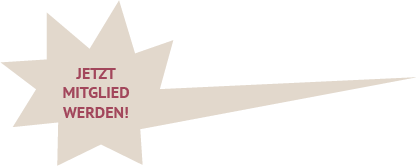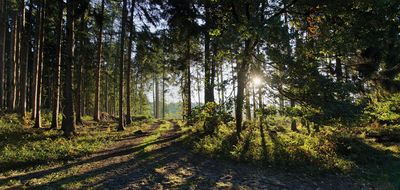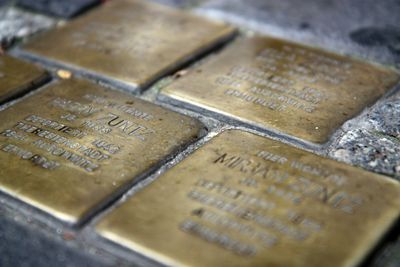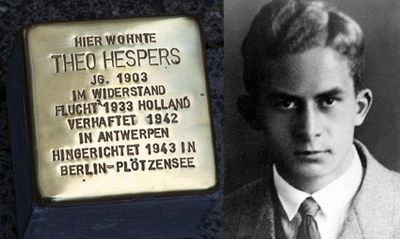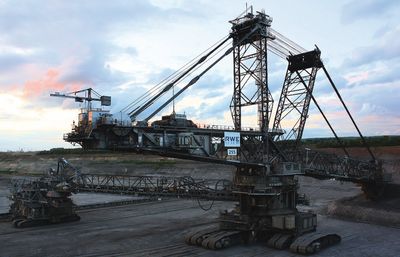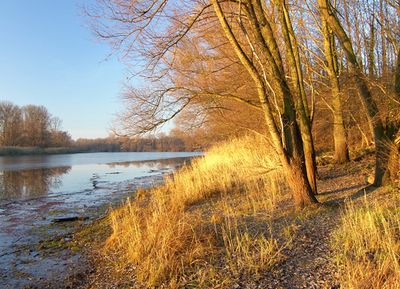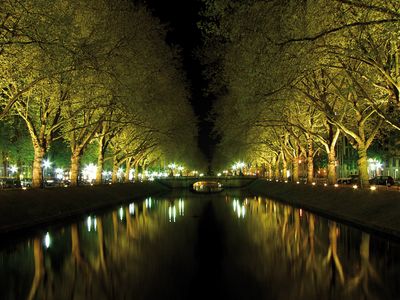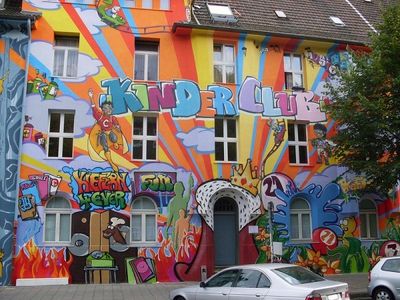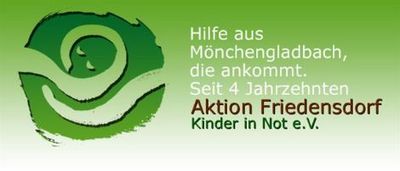Excursions
ESU22 offers several promising excursions in addition to the programme at the university. As the ESU preparatory group, we have decided that learning about ecological, economic and political contexts will not only take place in the rooms of the university. We will leave the university grounds and visit interesting places in Mönchengladbach, Cologne and Düsseldorf. Please register for these excursions in advance by emailing esu-excursions@esu22.eu and confirm this on arrival at ESU. Please include your name, age, phone number, language and the number of the excursion you want to go on. If you don't make it, you can ask at the Infopoint (ground floor building W) if there are still places available.
Participation is free of charge. Travel costs are at the expense of the participants and can be covered with the 9-euro ticket. Exciting discovery excursions await you!
1 The forest and climate change
The remains of old beech forests are typical of the Aaper forest. Individual trees are about 240 years old, and their crowns, up to 40 metres high, can be seen from a distance. Today, after decades of careful and near-natural forest management, a richly structured mixed deciduous forest with a high proportion of native red beech and English oak grows in this forest district. In addition, ash, maple, robinia, birch and bird cherry trees can also be found. Climate change is having a massive impact on the forest. Paul Schmitz, responsible for the municipal forest in Düsseldorf, explains on site in the Aaper forest how the municipality is dealing with this.
Duration: approx. 5 hours. Return journey: approx. 1 hour each way. Guided tour: 2.5 hours. Number of participants: 20, language: German
Thursday 18 August at 9:15 am. Meeting point: In front of the travel centre, Mönchengladbach main station. Departure: 9:45 am; Arrival Düsseldorf main station: 10:09 am, approx. 20min tram ride to "Jan-Wellem-Brunnen am Staufenplatz" accompanied by Attac Düsseldorf. Start of the excursion: 11am.
2 "Stolpersteine sind Lebenszeichen"- an excursion to the Gladbach House of Remembrance with lecture
In the old classrooms of the former school, several historically and socially engaged associations have set themselves up. There, the Christian-Jewish Society will give a lecture on the topic "Stolpersteine sind Lebenszeichen" (Stumbling Stones are Signs of Life), telling the life stories of personalities such as the philosopher Hans Jonas, the composer Hans-Walter David and a family.
Duration: 2.30h, number of participants: 30 (please register with names on the notice board at the reception until 12.15h) Language: German Speaker: Member of the GCJZ
Thursday: 18 August, meeting point: 1:10 pm in front of the ASTA office, then bus and short walk
3 Walking tour through Mönchengladbach in the footsteps of the resistance fighter Theo Hespers
Theo Hespers was born in Mönchengladbach in 1903 and murdered by the Nazis in Berlin-Plötzensee on 9 September 1943. In his resistance journal, an article states this thesis: "The renewal of living conditions, however, is only practically feasible if it is based on a new attitude." In view of the increase in right-wing radicalism and extremism, this thought will be the content of this event, which will end at the memorial to Theo Hespers in front of the comprehensive school of the same name in Mönchengladbach. Among other things, the pedagogical concept of the comprehensive school, which is a member of the network "School on the Move", is presented there, which attempts to implement Theo Hespers' legacy in a form that promotes democratic action, independent thinking and action, and participation.
Duration: 2h, number of participants up to 30, language: German, speaker: Ferdinand Hoeren (Theo-Hespers-Stiftung e.V.)
Thursday 18 August at 14.00, meeting point: square in front of the ASTA office, more details there.
4 Feminist tour through Cologne
Tour to different stations that give insights into different life situations of women* - travelling girls, lesbians, textile workers ¬- and reflect the struggles of the Cologne Women's History Association for the visibility of women in the cityscape.
Duration: approx. 5 hours. Return journey: approx. 1.5 hours each way. Guided tour: 2 hours. Number of participants: 25, languages: German/English, Speaker: Irene Franken
Thursday 18 August at 3.15 pm. Meeting point: In front of the travel centre, Mönchengladbach main station. Departure: 15:45; Arrival Cologne main station: 16:50. Meeting point with Ms Franken: Cologne main station, outside in front of the Bodyshop. Start of the excursion: 17:00 hrs.
5 Excursion and lecture in Mönchengladbach to save Wanlo from the lignite excavators
We will go to the Gladbach House of Remembrance. The head of the history workshop will tell something about the fight against the demolition of Wanlo for opencast lignite mining. The city of Mönchengladbach has been campaigning against lignite mining on the southern edge of the city since the 1980s. Over the years, it has campaigned for the protection of its groundwater reserves and successfully fought against the dredging of its southern district of Wanlo. To this end, all parties represented in the city council and the citizens' initiative joined forces to form an action group. Today Wanlo, the southernmost district of Mönchengladbach, lies directly on the edge of the quarrying area.
Duration: 2.30 hours with bus ride, Number of participants: 20, Language: German/French
Speaker: Karl Boland (history workshop)
Friday: 19.8, meeting point: 9.10 am in front of the ASTA office, bus ride and short walk
6 Cologne against the authorities - city history from below
Cologne has had a tradition of rebellious spirit since the Middle Ages: it was one of the first large cities to free itself from the feudal lords; in the carnival, people made fun of Prussian militarism; Karl Marx and Friedrich Engels published the "Neue Rheinische Zeitung" here from 1842; in the Nazi era, the courageous young people of the "Edelweiss Pirates" resisted the Nazis; in the 1980s, the city was a stronghold of the squatter movement. And today? A guided tour of the city from a left-wing, alternative perspective.
Duration: approx. 5 hours. Return journey: approx. 1.5 hours each way. Guided tour: 2 hours. Number of participants: 20, languages: German, English
Speakers: Jo Firmenich and activists from Attac Cologne
Friday 19 August at 09:15. Meeting point in front of the travel centre, Mönchengladbach main station. Departure: 09:41; Arrival Cologne main station: 10:36. Pick-up by Attac Cologne. Start of the excursion: 11:00 a.m.
7 Renaturation on the Düsseldorf Old Rhine
The Altrhein near Urdenbach is part of the Urdenbacher Kämpe nature reserve in the south of Düsseldorf. The Kämpe is one of the last floodplains on the Lower Rhine to be regularly inundated during floods. In order to allow the Urdenbacher Altrhein to develop naturally again, the summer dike was opened in two places between August 2013 and April 2014. After only a short time, numerous positive effects on the flora and fauna became apparent, which are being scientifically monitored and documented. Elke Löpke, scientific director of the Biological Station Haus Bürgel, will explain the project and its ecological significance on site."
Duration: approx. 6 hours. Return journey: approx. 1.5 hours each way. Guided tour: 2 hours.
Number of participants: 15, language: German. Speaker: Elke Löpke
Friday 19 August at 9:15 am. Meeting point: In front of the travel centre, Mönchengladbach main station. Departure: 09:45; Arrival Düsseldorf main station: 10:09, about 30min drive to the hikers' car park (at the beginning of the nature reserve) accompanied by Attac Düsseldorf. Start of the excursion: 11:30am.
After the guided tour, we will have the opportunity to eat in the restaurant near the hikers' car park.
8 Climate walk
The climate walk is a key measure of the information campaign Düsseldorf Climate Adaptation Concept. The aim of the 2.5-kilometre-long walk is to make the city climate, climate change and climate adaptation comprehensible and tangible at specific locations. The walk leads at 9 stations through the urban heat island, which is a typical feature of the urban climate and thus also of Düsseldorf's climate. Due to high sealing and dense building development, higher temperatures can be measured here than in the surrounding area, especially in summer. At the individual stations, exemplary climate adaptation measures are presented, climate changes are made visible and the special features of Düsseldorf's urban climate are pointed out. And along the way, it takes you to some of the most beautiful places in Düsseldorf.
Duration: approx. 4 hours. Return journey: approx. 1 hour each way. Guided tour: 2 hours.
Number of participants: 20, language: German. Speaker: Elke Cardeneo
Friday 19 August at 12:15 pm. Meeting point: In front of the travel centre, Mönchengladbach main station. Departure: 12:45; arrival Düsseldorf main station: 13:09, about 3min by underground after the underground stop Steinstraße/Königsallee, meeting with Ms Cardeneo. Start of the excursion: 1:30pm
9 Over 180 years of the "Fichtenstraße" - from "Eisenbahnstraße" to state-approved trouble spot
A very exciting tour from Fichtenstraße to Erkrather Straße, informing about Düsseldorf's railway history "Die Klöckner Werke" and about the residential area along Kiefernstraße.
Duration: approx. 4 hours. Return journey: approx. 1 hour each way. Guided tour: 1.5 hours Number of participants: 15, language: German, French
Speaker: Kaspar Michels
Friday 19 August at 12:30 pm. Meeting point: In front of the travel centre, Mönchengladbach main station. Departure: 12:54; Arrival Düsseldorf main station: 13:28, about 20min walk to Fichtenstraße 2 accompanied by Attac Düsseldorf. Start of the excursion: 14:00 hrs.
10 Children in the ONE WORLD: When many dream together...
... it is the beginning of a new reality. In this firm conviction, the local association "Aktion Friedensdorf - Kinder in Not Mönchengladbach e. V." has been supporting small, grassroots projects for children in crisis and emergency situations in Asia, Africa and Latin America since 1969. Since then, many children and young people have been able to realise their life's dreams and later become bearers of hope for their home countries. Our projects in Ghana formed the nucleus for the partnership of the ONE WORLD Forum of our city with the Offinso district there, which was also supported by the city of Mönchengladbach.
We invite you to share your experiences and exchange ideas in our ONE WORLD Information Centre, which has served as an exhibition space for our project work since 1998 and is also open as a meeting place for other groups for ONE WORLD activities.
Duration: 2 h, Number of participants: 20, Language: German/English
Speaker: Franziska Suffenplan-Göbels / Dirk Sasse
Friday, 19.8. at 16.00, meeting in front of the main station Mönchengladbach Reisezentrum at 15.40 (person with Attac sign) Location: EINE- WELT-Informationszentrum, Erzbergerstr. 84, 41061 Mönchengladbach at 16.00
Picture credits
1 Heinrich Linse_pixelio.de
2 Esther Stosch_pixelio.de
3 Klaus-Dieter Machynia CC BY-SA 3.0
5 Rike_pixelio.de
6 Stadtarchiv Köln
7 Dieter Stehle_pixelio.de
8 Sandra Nabbefeld_pixelio.de
9 Marek Gehrmann CC-Lizenz 2.5

